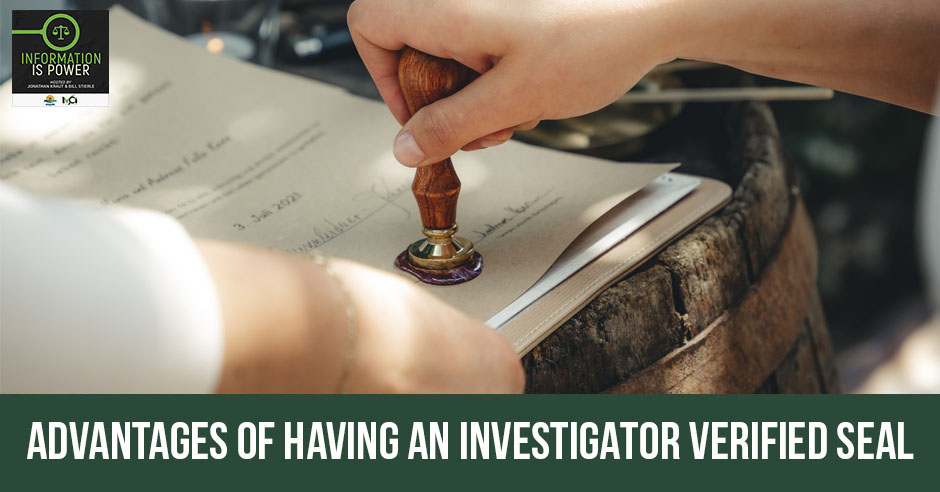Not all background checks in organizations are thorough enough to warrant the best profile of an individual. By having a seal, a client is more secure about the quality of work that one provides. In this episode, Jonathan Kraut and Bill Stierle discuss Jonathan’s organization’s trademarked “Investigator Verified Seal” and how it allowed private investigators in his firm to show a higher level of credibility to their clients. What is more, they discuss about its other benefits in the aspects of marketing and business growth. Listen to this episode as Jonathan and Bill talk more about credibility and safety in the organization.
—
Listen to the podcast here:
Advantages Of Having An Investigator Verified Seal
Using The Investigator Verified Seal For Marketing, For Business Growth, And Increasing Your Company Revenue
Jonathan, it’s good to see you again. As always, I’m excited to get into the information that you have provided for us. The transfer of information this way has been valuable to you, your clients, the attorneys that you serve and all the different people that come into your world that makes a big difference. It’s going to be good to start talking about how do you take advantage of the Investigator Verified Seal because a lot of people think they can wing investigations by going online and doing some searches. Maybe you could tell us a little bit about that. How as a California private investigator have you been able to make a big difference with the seal? Tell us a little bit about the seal and what this is about.
A few years ago, our organization trademarked this seal because we wanted to allow our clients to differentiate between those who make invalid claims, for example, on cable, on TV and on the radio. They say our people are background checked and that should be sufficient. In fact, when they say they’re background checked, the reality is they ask them for their driver’s license or they do an instant search, which picks up 20% of the criminal cases, no civil cases and child abuse. They think they’re background checked. Trying to differentiate between a real background check by a real agency and someone who says that we are or we do, they don’t.
I’ve never thought of it this way, but it’s about how do you get trust to take place. How do you get certainty to take place as well as respect that the work you’re doing and the work you’re paying for is going to cover you in a legal setting or in a criminal setting. What a big difference and what a great idea to have an Investigator Verified Seal to create a brand and a trust that can make a difference.
Not that we’re angry at other people for saying that they’re background checked and they’re not, but we’re not trying to encourage that statement without backup.
It’s about truth. It tells the client you care. Tell us about some of the recommendations you give when you are allowing people or having people use the seal.
To use the seal with our organization and perhaps with others is that a comprehensive search must be conducted by a licensed agency and the different levels of comprehensive searches depending on the need. A client of ours can post that certificate on their wall and can tell their clients, “We have a licensed agency doing a comprehensive search.”
Regarding different marketing opportunities, you can use it in different ways.
There are organizations to put our seal on their business cards, on their letterhead. The purpose is to draw attention and to get a question like, “What is that and what does it mean?” which is wonderful because then you can say, “We have a thorough background check on our people.” We don’t sit up and say that they are. We have a third-party agency that you can call and verify that they are.
It’s like the next level of this has been certified. You see many higher quality products do this, that this is certified. This is coming from a very specific measuring agency that can make a difference.
We ask our clients if they’re willing to post them on their promotional material, on their web page. We want their clients or their potential clients to ask, “What is that? What does it mean?” It’s a great differentiation between another organization that doesn’t have anything to support their claim that people are background checked.
Trust and certainty, but reliability that’s going to start showing up. This inviting of questions, this curiosity about what the range of coverage you provide, how does this lead to increasing business? What does this next level allow your clients to do?
An Investigator Verified Seal is a very good mechanism to create trust and separate oneself from everyone else. Share on XI’ll give you a couple of examples. One is an elder care company. They’re caregivers and they have a chain of offices. They put it on their letterhead and they promote it. They put it in their brochure. They say that all their caregivers are checked by an outside agency thoroughly, which is us in this case. That allows them to, let’s say, outshine the competition. The competition may say, “We check people thoroughly.” “Do you have anything to show that you do?” “Yes, we do.” “Who does that for you?” “That’s secret. We can’t tell you.” That leads to more business because it leads to more trust with an organization that’s willing to disclose what they do and how they do it.
That leads to authority and credentialing. You want their customers to draft off of the respect and the certainty that you provide. It gives us an extra sense that there’s something more going on with this company.
When you walk into a doctor’s office, you’re looking for their certificate, their PhD or their MD, their diplomas, their awards. It’s reassuring the potential client that this is a real organization or real person that’s worthy.
It’s that stamp. What does the seal mean? What are the elements that go into getting certified like this?
When a client of ours wants to use a seal, they’ve got certain conditions. Every member of their team has to be evaluated. We go to two levels, either criminal or a comprehensive misconduct search, which includes criminal harassment, elder abuse, child abuse, the whole thing. In some cases, criminal is sufficient. The point is that an outside licensed agency conducted the search and that we can independently verify that the search was done. We also look for stalking FBI reports. We go into anything that might give more confidence than we’ve checked. The client feels better about our check.
It’s turning over the various different rocks that the information is held underneath. It’s jumping through those extra hoops, which is one of the things that you and your trained professionals that work with you provide.
We know where to look and we know how to get information. We know what rocks there are and we know how to get information from under them.
You also recommend having these things periodically checked too to give that added enforcing trust.
Insurance carriers have told us that every two years, in most cases, is sufficient. A lot of individuals who have been with an organization for a couple of years, maybe somewhere between maybe 3% to 12% will have arrests or convictions after they were hired, especially if they’re relating towards money or taking care of other people or treating coworkers fairly. You want to recheck in some cases like hospitals, maybe elder and childcare. You want to check every year. What if we bring someone in a few years later and something horrendous occurs? It’s in the public record. We don’t know and we assume that that person’s fine. We don’t check what if they do something terrible like they had done before. Maybe not in a business setting, but in a private setting. We should know about that. We shouldn’t assume that anyone working for us is always going to be perfect all the time.
That’s consistency. What else does this seal represent? What are some other things that it does?
It says that a legally-licensed agency performed a search and only licensed investigators can assess character. Therefore, it has to be a PI agency. There is a report on the letterhead signed by somebody in the personnel file of the individual and also, the agency has a copy of that file in case anyone wants to verify.

Investigator Verified Seal: With an Investigator Verified Seal, the odds of being with inappropriate people are very much reduced. People feel safer and more likely to stay at a company that has people like them.
The tracking is there.
That’s important. Let’s say one of our clients says, “My potential business partner wants to know how do we do this and how is it done?” They can call us and ask us directly. They don’t have to guess or make up something. Rather than go to the authority, get the information and everyone should be satisfied.
Relevant counties, states, are you looking all over the place to see where the information is?
We’re looking everywhere. We’re not doing a quick $15 search online, “Are they in the directory or not?” We’re digging for new records, for warrants, for things that might be relevant to the employer or to whoever it is we’re looking for.
How do this seal and your process lead to better recruiting of the staff confidence? What does it take?
What we found out was that a lot of people who want respect to be treated correctly on the job are worried about their coworkers. When they go through a rigorous background check and they pass, which most people do, they are aware that everyone else went through the same thing. The odds of being with inappropriate people are very much reduced. They feel safer and more likely to stay at a company that has people like them.
It’s also reassuring that every year or two years, it’s to promote self-reporting. It becomes safer to talk about bad things that take place, I’m guessing.
When everyone knows that in a year or two they’re going to run another one, it’s likely that someone that had an issue will go to their management or their team and say, “I had an issue,” and deal with it upfront knowing we’re going to find out anyway. Knowing how embarrassing it would be if we disclose it, some people rather come forward. It’s not always necessary to terminate somebody with a record, but if they’re undergoing a legal process, the employer should know and maybe that person needs support. We can’t always judge them as being inappropriate. We don’t know the answer until the case is over.
Is there a standard of accountability then?
That’s right. We’re encouraging a self-reporting in this process and a recheck makes that more likely.
When there is this self-reporting, is this why certain organizations say, “We can regulate it ourselves, but meanwhile they can’t regulate it themselves. In other words, “There’s not enough, I don’t know about. There’s not enough, maybe you can answer this question.” This is an integrity question. Is the industry on a scale of 1 to 10, from high integrity to low integrity? Your organization is going to be closer to high integrity. From 0 to 10, give yourself a ten, maybe a nine, but most likely a ten. What’s the industry, if you do a little navel-gazing with the industry and look at your belly button as the industry? Where is everybody? Are they like a five? How well they track things?
Information is power. With good information and great information, you make good decisions. Share on XIf you’re talking about online services where you click right now on your phone or go online and find somebody who’s been background checked, I will put them at a 0 or a 1. From our experience, they don’t do anything. They don’t check anything or they might charge a lot of money. There’s one organization that charges $250, $300 for you to do one on yourself, which is way too much. They’re missing a lot of vital items like civil harassment, stalking. They’re missing all that. They’re not getting warrants. They’re not getting new cases. There’s no validation from the agency doing the work. In other words, they do it themselves. They’re in a different line of work and who knows what they come up with.
As far as online organizations go, it’s low and deceptive. Middle of the road, for example, security companies are reviewed. Their offices are reviewed by the state. About 1 in 3 security officers who are approved by the state that have a license and carry a badge are convicted criminals. I’d give the states in that industry maybe a three. It’s a little better to have an organization like a state do it. It’s only in that state and they give a lot of things. In the investigations field, I know a few organizations that do a misconduct search. They do a lot of criminal searches, but they’re not looking for everything. I’d say maybe it’s 6 or 7 overall in our industry where they’re not looking everywhere and they do not want to. It’s a little harder and why do it if people don’t want it?
I can appreciate it. Who can use the seals? Tell us a little bit more about this.
There are individuals who post online their availability for work like contractors, nannies, daycare, and elder care. It could be removing the trash. It could be being a gardener. It could be a plumber. It would be nice to have that seal next to their picture. If they click on the seal, there’s a link to us and we can verify that person was cleared. That’s a good mechanism to create trust and separate oneself from everyone else.
That the business is operating in the United States?
Any organization in the US can use our services.
Jonathan, I’m seeing that who can use this seal are self-employed people, hosting services on the internet at whatever internet directory that the business is operating at. You’re looking for these individuals to take advantage of this next level of certainty that they can translate to their clients, “I’m a plumber. I’ve been background checked. I’m clean on this.”
A lot of people say, “I’ve been background checked.” The question is, “What does that mean?” Mostly it doesn’t mean anything these days. We’re trying to separate the real background checks with a seal, something that can be independently verified with the statement, “I’ve been background checked,” which we find to be not only misleading but a little surreptitious. Again, a lot of these organizations that make that statement don’t have anything behind it to say that they did it other than their work.
How do you get started using this?
With our organization, we have our clients fill out a form or they can ask another organization, “Do you have a seal?” Our clients read and accept the agreement terms, which is you’re allowed to use it for free as long as you check everybody and periodically by a licensed agency. They sign it and we get them started. Usually, if they signed the agreement and they have to go back and recheck their staff, we will need about a month to go through everybody. Live scan or state searchers only check the state you’re in and federal records. We can’t assume that another agency did it correctly and comprehensively unless there’s a signed letterhead. Maybe, in that case, we might accept it as being valid.
It’s a huge difference. It sounds like the JPEG will be emailed and the person could start putting it on different places inside their environment to validate it. What we’re building is respect. We’re building trust. We’re giving some certainty about things.

Investigator Verified Seal: It’s not always necessary to terminate somebody with a record, but if they’re undergoing a legal process, the employer should know and that maybe, the person needs support.
We’re trying to get our clients more business, an advantage in the marketplace. It’s not always the cost. It’s also the services that one provides.
For more information about ways that Jonathan and his team can support you to get greater protection, why don’t we send them to your website and give you a call? I’ve experienced that many times that your staff and you are very open and ready to offer information. That’s huge.
Our email is Info@NetCheckPI.com or go to our website, www.NetCheckPI.com. We have to remind everybody that information is power with good information and great information, you make good decisions. Without information, it’s a hit and miss and so we want everyone to make good decisions.
Jonathan, this has been great. I’m looking forward to the next time we’re together. Until then, more to come.
It’s great. Thank you, Bill.

